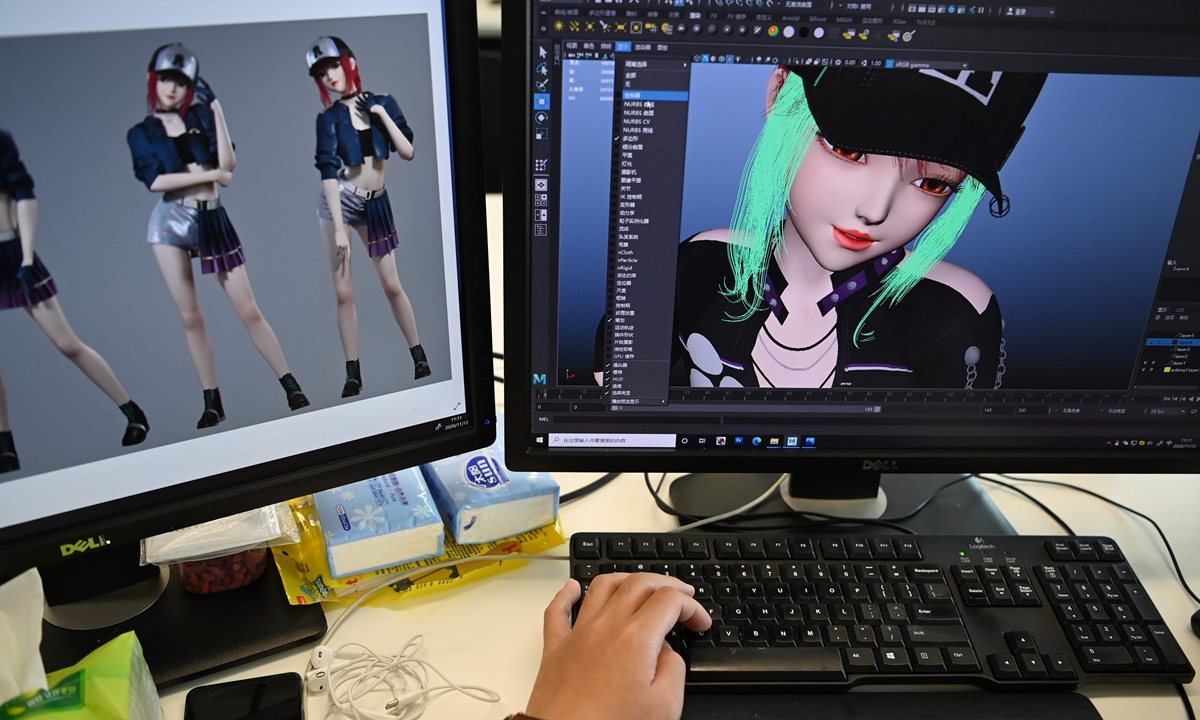China’s virtual idol industry booming, attracts more than 300 million fans

The image of a virtual idol "Liu Ge" is being designed. Photo: VCG
Many consider 2020 to be the year that virtual idols finally took off in China because of its increasing market scale, the accession of entertainment and technology companies and the appearance of virtual idols on platforms such as livestreaming services.
"There are nearly 250 million people in China belonging to the post-1995 generation. They account for 52 percent of the total Chinese internet users, and the potential fans of virtual idols exceed 300 million people. The virtual idol industry will usher in better opportunities to gain a large number of followers," Chen Wei, producer of a web show on iQiyi that seeks to select the most popular virtual idols, told the Xinhua News Agency.
Many Chinese companies have joined in the virtual idol competition, including some traditional entertainment companies like Yuehua Entertainment, which represents top Chinese idols such as Wang Yibo.
Chinese video-sharing platform Bilibili has also been taking part in the trend. According to the platform, it has been holding a virtual idol concert in front of live audiences for the past four consecutive years, making it an earliest platform in China to hold such "live" concerts.
A virtual singer produced by Bilibili named Yousa has more than 2.69 million followers on the platform. She held her latest stage concert in December 2020.
Yousa has her own characteristics, which include her height, weight and talents. An employee at Bilibili showed a group of statistics to compare the number of fans on social media and view amounts of related videos among three virtual idols: Yousa, Kizuna AI and Hatsune Miku.
According to data from Bilibili, compared to popular virtual idols Hatsune Miku and Kizuna AI from Japan, Yousa has the most followers on social media with 970,451 followers on Sina Weibo against Kizuna AI's 554,000 and Hatsune's 205,000 on Twitter.
However, Bilibili noted that Kizuna AI wins when it comes to the number of views of her videos posted on its platform.
Virtual idols have become so popular that it has been common for them to perform alongside real-life stars on stage. Xingtong, a virtual idol from Tencent, danced alongside the well-known Chinese dancer Yang Liping at a gala in 2019.
They have even further crossed the line between reality and virtual reality by going on with talk shows for interviews. When Cai Kangyong, a famed host and writer from the island of Taiwan, interviewed Yousa on a show, he commented, "I think you are a warm-hearted person."
In addition to these appearances, virtual idols are also being paid to promote products on their livestreams similar to how major celebrities are hired for commercials. According to a report from entertainment site TMTPOST, the sponsorship fee for Luo Tianyi, another virtual idol, can reach 900,000 yuan ($138,900), more than what the top live streamers such as Li Jiaqi and Viya charge.
Shi Wenxue, a culture critic based in Beijing, explained why these virtual idols are able to attract so many fans and earn so much money.
"Virtual idols are perfect and can fit the imagined ideals of various netizens. Their virtual nature creates a fantasy, a beautiful and pure world for fans. The deep love these fans have for virtual idols can then be shown by consuming products in real life," Shi told the Global Times. "Buying products related to virtual idols gives fans emotional pleasure and satisfaction."


